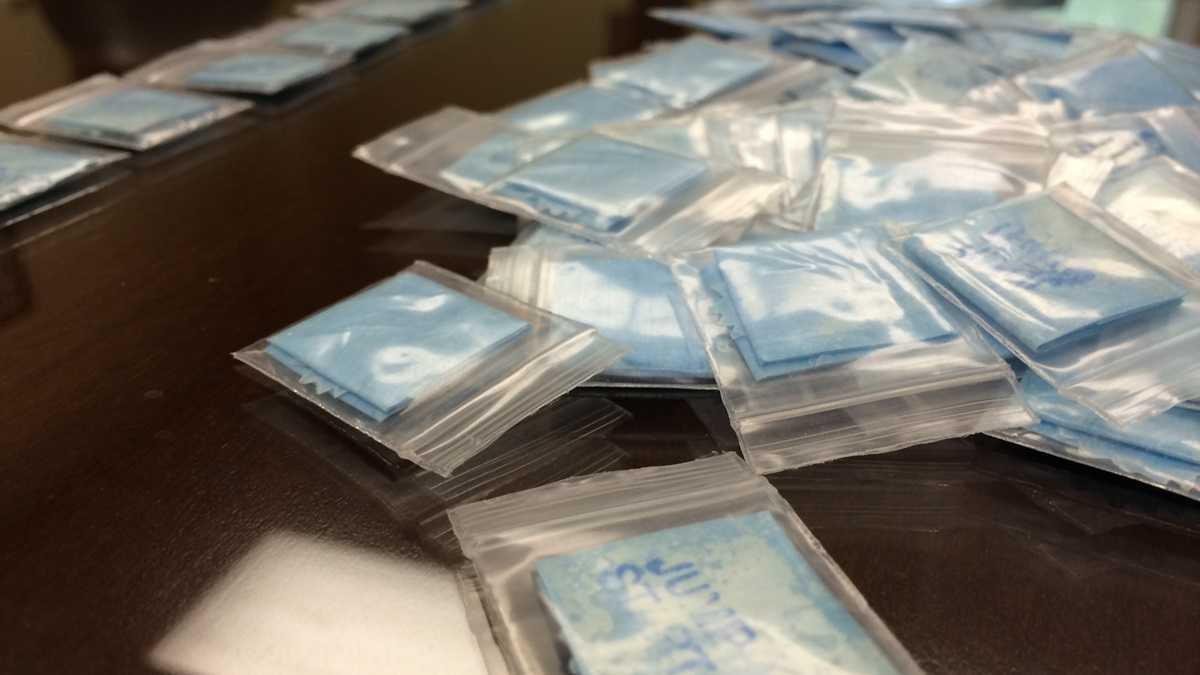Should drug dealers be charged as killers in overdose deaths?

(Shirley Min/WHYY
Five months after a Pottstown mother of two died after injecting fentanyl-laced heroin, authorities yesterday arrested her alleged drug dealer on a felony criminal homicide charge.
Harold Robert Burton’s arrest was the latest proof that the nation’s war on drugs, which appeared to be winding down with the decriminalization of marijuana, has instead just shifted gears. Faced with an uptick in overdose deaths from heroin and other opioids, authorities have been treating addicts’ deaths as homicides and holding their dealers accountable as killers.
Burton, 36, of West Mount Airy, was jailed on $1 million bail and faces up to 40 years in jail if convicted in the Jan. 29 overdose death of Renee Winslow, 31, according to the Montgomery County District Attorney’s Office. He was charged with drug delivery resulting in death, an offense akin to third-degree murder, and related crimes. He faces a July 6 preliminary hearing.
“Renee Winslow’s death was not attributable to a violent crime. This death is attributable to someone poisoning her, poisoning her with this very deadly drug fentanyl,” Montgomery County District Attorney Kevin R. Steele said. “Drug dealers, beware: You give a drug to someone and they die, you are on the hook for drug delivery resulting in death.”
Investigators found that Winslow had traded texts with Burton the night before she died, asking for heroin, according to an affidavit. The next morning, Winslow’s boyfriend found her dead in her apartment and alerted police, who found a needle and three drug baggies that tests later determined had contained fentanyl, the affidavit states.
Fentanyl is a synthetic opioid experts say is 50 times deadlier than street-level heroin, which it resembles. It’s also what killed Prince in April.
Opioid overdoses have quadrupled nationally since 2000, and Pennsylvania saw a nearly 13 percent jump in such deaths from 2013 to 2014, the most recent year data was available, according to the Centers for Disease Control.
Most states have some version of so-called “drug-dealer liability” law, intended to hold dealers accountable as killers when their customers overdose. And many have been on the books for years, although they weren’t widely used, primarily because many addicts who overdose have multiple substances in their bodies and an unclear path back to their dealers, muddying the prosecutorial waters.
But this decade’s heroin epidemic has driven many prosecutors to rely on it more, especially as community outrage spikes after celebrities like Prince and actor Philip Seymour Hoffman fall victim.“This isn’t just in one neighborhood in Montgomery County. It’s in every neighborhood in Montgomery County,” Steele said. “People are dying, and we need to be focused on solving this.”
Steele has grown so concerned about the deadliness of fentanyl that he issued a memo today exhorting police chiefs countywide to change their drug-handling policies. Instead of field-testing substances to determine what drug something is, he directed chiefs to have officers deliver suspected drugs directly to the lab untested.
“Not only is this stuff deadly for addicts, but it could be deadly for the officers and their K9 partners too,” he said.
Critics have raised constitutional questions about holding drug dealers accountable for murder.“In drug-related cases, the applications of the felony-murder rule are contrary to longstanding legal and constitutional principles,” a Texas law professor wrote in 1986. “First, regardless of the felony committed by a drug supplier; the act of supplying the drug does not legally cause a user’s overdose and death. Second, those courts that use the rule violate the accused’s constitutional guarantee of due process of law by failing to prove the causation element of the crime beyond a reasonable doubt.
Finally, by treating drug suppliers as murderers, and thereby requiring that they be punished as severely as those who either intend to or legally cause the death of others, the courts necessarily impose a disproportionate sentence in violation of the Eighth Amendment prohibition of cruel and unusual punishment.”
But many frustrated law enforcers have held firm.
“This (opioid overdoses) is on the rise,” Steele said. “Our overdoses are going up and if the projections continue on this year the way this has gone, this is going to be one of our deadliest years. So I would anticipate you will see more of this charge.”
In March, Lycoming County’s coroner jumped into the fray with an unusual approach. Coroner Charles E. Kiessling Jr. announced he would rule heroin overdoses homicides, even though elsewhere they’re considered accidental deaths.
“I don’t care if I offend people,” Kiessling Jr. told PennLive. “Drug dealers are murderers and belong in state prison.”
WHYY is your source for fact-based, in-depth journalism and information. As a nonprofit organization, we rely on financial support from readers like you. Please give today.

